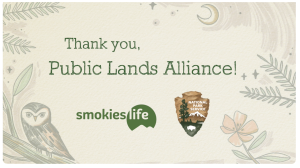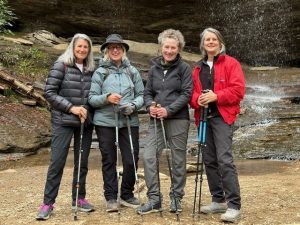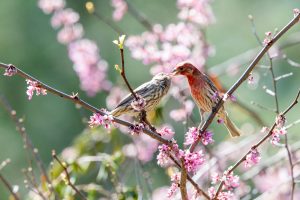
George Masa’s influence recognized as biography publication draws near
Throughout the National Park Service’s 108-year history, countless people have made sacrifices, taken stands, and

Throughout the National Park Service’s 108-year history, countless people have made sacrifices, taken stands, and

This April, Smokies Life received national recognition at the 2024 Public Lands Alliance Partnership Awards

Frank X Walker and David Brill share a fascination with the Great Smoky Mountains. One


As the days grow warmer and the landscape ripples with color, a growing treetop chorus
FF: How do you define a spider?
KC: Any member of the order Araneae in the class Arachnida with two main body parts and with two unique characteristics: silk produced through spinnerets located on the abdomen, and the male pedipalp as an organ for transferring sperm to the female.
FF: How many species of spiders are found in the Smokies? Have some been discovered through the All Taxa Biodiversity Inventory work?
KC: Yes, 531 species of spiders have been recorded in the park, 41 of them new to science.
Tan jumper Platycryptus undatus. Photo by Kefyn Catley
FF: What are some of the many good things that spiders do for us and for the ecosystem?
KC: As top predators they are pivotal in structuring terrestrial ecosystems by controlling herbivorous insect populations. The spiders on two acres of North American forest consume 48 metric tons (105,840 lbs.) of insects in a year (Wise, 1993). Without spiders, we would probably succumb to some nasty insect-borne disease while waiting to starve to death.
FF: Who are the “kin” critters that you plan to mention during your discussion and why are they beneficial?
KC: They are all the other arthropod groups, the little and largely unseen creatures that run the world. They provide all the life support systems that humans and the whole terrestrial biosphere rely on for continued existence. Close to a million species of arthropods have been described; there are likely to be 10 million more. Arthropods regulate all the main ecological terrestrial systems on the planet. Without them, it has been estimated that all almost all life on land (including humans) would go extinct in nine months.
FF: Many people are afraid of all spiders because a few have harmful bites. How do you assuage these fears?
KC: Spiders are not poisonous; they are venomous. The evolution of venom is one of two innovations (the other being silk) that make spiders the hugely successful group they are. All spiders except for one family produce venom that paralyzes their prey and starts the process of digestion by breaking down tissue.
Less than 1 percent of the total number of known spider species are toxic to humans. In the U.S. between the years 1979 and 1991, 1,135 deaths were officially attributed to lightning strikes, 591 to bee stings, 72 to snake bites and 57 to alleged spider bites (as many as 80 percent of spider bites are routinely wrongly diagnosed). This translates to a 20 times greater chance of being struck and killed by lightning than by being killed by a spider bite! The chance of one being killed by a bee or wasp sting is 11 times greater than being killed by a spider.
The only spider native to this area that—very rarely—envenomates humans is the black widow (Latrodectus spp. Theridiidae). Fortunately, like most spiders, these are shy and retiring and do not threaten humans.
Science at Sugarlands
To commemorate its 20th anniversary and provide learning opportunities related to the All Taxa Biodiversity Inventory, Discover Life In America is hosting its Science at Sugarlands series.
These family-friendly talks begin at 1 p.m. and are free to the public at Sugarlands Visitor Center, 1420 Fighting Creek Gap Road, Gatlinburg, TN.
The Great Smokies Welcome Center is located on U.S. 321 in Townsend, TN, 2 miles from the west entrance to Great Smoky Mountains National Park. Visitors can get information about things to see and do in and around the national park and shop from a wide selection of books, gifts, and other Smokies merchandise. Daily, weekly, and annual parking tags for the national park are also available.